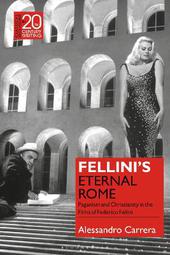
|
Fellini's Eternal Rome: Paganism and Christianity in the Films of Federico Fellini
Paperback / softback
Main Details
Description
*** Winner of the2019 Flaiano Prize in the category Italian Studies *** In Fellini's Eternal Rome, Alessandro Carrera explores the co-existence and conflict of paganism and Christianity in the works of Federico Fellini. By combining source analysis, cultural history and jargon-free psychoanalytic film theory, Carrera introduces the reader to a new appreciation of Fellini's work. Life-affirming Franciscanism and repressive Counter-Reformation dogmatism live side by side in Fellini's films, although he clearly tends toward the former and resents the latter. The fascination with pre-Christian Rome shines through La Dolce Vita and finds its culmination in Fellini-Satyricon, the most audacious attempt to imagine what the West would be if Christianity had never replaced classical Rome. Minimal clues point toward a careful, extremely subtle use of classical texts and motifs. Fellini's interest in the classics culminates in Olympus, a treatment of Hesiod's Theogony for a never-realized TV miniseries on Greek mythology, here introduced for the first time to an English-speaking readership. Fellini's recurrent dream of the Mediterranean Goddess is shaped by the phantasmatic projection of paganism that Christianity created as its convenient Other. His characters long for a "maternal space" where they will be protected from mortality and left free to roam. Yet Fellini shows how such maternal space constantly fails, not because the Church has erased it, but because the utopia of unlimited enjoyment is a self-defeating fantasy.
Author Biography
Alessandro Carrera is John and Rebecca Moores Professor of Italian Studies and World Cultures and Literatures at the University of Houston, Texas, USA. He has written on Italian and Comparative Literature, Italian and Continental Philosophy, music, and cinema. He has translated into Italian three novels of Graham Greene and all the songs and prose of Bob Dylan.
ReviewsFellini's Eternal Rome is one of those miraculous works of criticism that moves from deep and novel intuitions of broader cultural significance, unfolding them gradually and pervasively in what seem at first to be digressions, yet that quickly reveal themselves to be the necessary pieces of a puzzle that form a novel and persuasive explanation of Fellini's cinema. The book is a most carefully researched and effectively presented advance in modern Italian cultural history, a contribution delivering new and momentous insight that will undoubtedly stimulate further research on Fellini. * Journal of Modern Italian Studies * Professor Carrera is to be congratulated on this diverting and informative study of the life and work of the pagan-Catholic King of Cinecitta. * Catholic Herald UK * Offering fresh insights and personal anecdotes, Carrera details the doubts, conflicts, and artistic decisions made by the director during his long career in the cinema. Summing Up: Highly recommended. Upper-division undergraduates through faculty. * Choice * [Fellini's Eternal Rome] stimulates readers to a new appreciation of Fellini's films at 25 years from his death. * The Italian Insider * Carrera's readings of paganism and Christianity in Fellini's work are engaging, provocative and often brilliant, augmented by his highly original and at times irreverent authorial voice. * Journal of Italian Cinema & Media Studies * Alessandro Carrera's engagement with Fellini is both personal and intellectual. In this groundbreaking study, he compellingly unpacks the Italian director's at times perplexing aesthetics by bringing to light the conflictual relation between the Pagan and the Christian elements that recur in his cinematic production. The unresolved relation at the centre of Fellini's cinematography provides a critical key to the understanding of his artistic genius. Alessandro Carrera's sophisticated knowledge of both the classical world and contemporary Italian society, together with his consummate ability to draw original and convincing connections between seemingly distant literary and artistic discourses, produces a compelling re-interpretation of Fellini's films. An engaging critical journey, an enjoyable narrative replete with captivating anecdotes, Alessandro Carrera's study is a must for Fellini's present and future scholars and an essential reading for anyone interested in deepening their understanding of one of Italy's greatest cinematographers. * Simona Wright, Professor of Italian, The College of New Jersey, USA * Alessandro Carrera's research represents an important contribution to a theme of great importance in the film production of [Federico Fellini] ... Carrera follows a difficult but profitable path; through a series of insights, he builds its demonstration by revealing the indissoluble link in Fellini's philosophical imaginary between paganism, Christianity and Rome. * Thersites Journal (Bloomsbury Translation) *
|